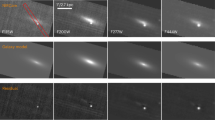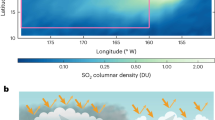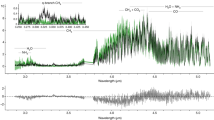Abstract
THE heavy ionizing particles in the cosmic rays are so rare that it seems unlikely that much information can be obtained from experiments with cloud chambers. The only method at present available which can yield quantitative results is the method of direct photography, which has been used recently by several investigators mainly for investigating the nuclear disintegrations which the cosmic rays produce1,2. On a plate which has been exposed for a sufficiently long time is observed, in addition to a great wealth of phenomena associated with disintegration effects, a large number of single tracks probably due to protons or slow mesotrons.
This is a preview of subscription content, access via your institution
Access options
Subscribe to this journal
Receive 51 print issues and online access
$199.00 per year
only $3.90 per issue
Buy this article
- Purchase on Springer Link
- Instant access to full article PDF
Prices may be subject to local taxes which are calculated during checkout
Similar content being viewed by others
References
Blau and Wambacher, Sitz. Akad. Wien, 146, 623 (1937).
Schopper and Schopper, Phys. Z., 40, 22 (1939).
Schopper, Naturwiss., 25, 557 (1937).
Author information
Authors and Affiliations
Rights and permissions
About this article
Cite this article
HEITLER, W., POWELL, C. & FERTEL, G. Heavy Cosmic Ray Particles at Jungfraujoch and Sea-Level. Nature 144, 283–284 (1939). https://doi.org/10.1038/144283a0
Issue Date:
DOI: https://doi.org/10.1038/144283a0
This article is cited by
-
Heavy Nuclear Splinters
Nature (1949)
-
Zum Mechanismus der hochenergetischen Kernprozesse der Ultrastrahlung
Die Naturwissenschaften (1947)
-
Origin and Nature of Heavy Ionization Particles Detected on Photographic Plates Exposed to Cosmic Rays
Nature (1941)
-
Absorption of Heavy Cosmic Ray Particles
Nature (1940)
-
The Possibility of Detecting a Doubly-Charged Proton by the Photographic Method
Nature (1940)
Comments
By submitting a comment you agree to abide by our Terms and Community Guidelines. If you find something abusive or that does not comply with our terms or guidelines please flag it as inappropriate.



